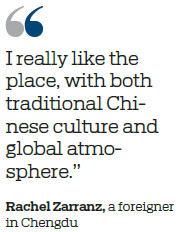Culture wall among programs helping expatriates adapt to China
Construction is underway on a "culture wall" that tells stories about how foreign residents come, settle down and adapt to their new lives in China at an international community in Chengdu, capital of Southwest China's Sichuan province.
Construction began in early December on the wall, located at the Shenghua community in Shiyang subdistrict of Chengdu Hi-Tech Industrial Development Zone. It will be painted by students and teachers from Chengdu Montpellier Primary School.
The aim is to connect residents from around the world in the form of art.
|
Left: Expats play in a football match organized by the Chengdu Hi-Tech Industrial Development Zone. Right: Foreign residents attend a charity sale event in Shenghua community. Photos Provided to China Daily |
|
Above left, center and right: Expats and local children take part in an arts carnival activity in the Chengdu high-tech zone. Photos Provided to China Daily |
The four sections of the wall will feature paintings of renowned buildings from different countries, giant pandas and Sichuan Opera, the first impressions of foreigners about Chengdu and the stories about how they get married, build families and make their new homes in Chengdu.
The Shenghua community is home to about 200 foreigners. Besides the wall, the community also held a series of cross-cultural activities since August, such as blind dates, a music festival, charity sale and painting, as part of their efforts to construct a friendly and harmonious international community.
During a recent arts experience event, visitors learnt to paint on umbrellas, write with invisible ink and make props for an opera performance.
Rachel Zarranz, a foreigner in Chengdu, said she invited several friends to participate in the event.
"I really like the place, with both traditional Chinese culture and global atmosphere," she said, adding that she often spent weekends there.
"It would be perfect if there was more food from overseas."
The event attracted about 2,000 people, including more than 20 foreign residents from countries such as the United States, United Kingdom, France, Switzerland and Venezuela.
At the charity sale held earlier this month, children from more than 230 families brought their used toys and books, which were sold for 12,922 yuan ($1,875). The cash, as well as 200 copies of children's books and 300 toys, will be donated to children with congenital heart disease, or CHD.
The sellers were mainly students from Chengdu Montpellier Primary School and Yizhou Primary School in the Chengdu high-tech Zone.
Leaders of the "Hopeful Hearts" Sichuan team, co-organizer of the event, said they believed spreading the idea of helping others in need among children can help promote development of charity work.
The team was established in 2003. Its members mainly include expats in Chengdu. So far, they have helped more than 530 children with CHD.
Li Ji, a local resident, brought her child to the charity sale.
"Compared with school life, which is mainly about academic study, such community events can help children to better adapt to society and learn how they can contribute to society in the future," she said.

She added that such events can also boost communications and help to overcome differences in various cultures.
Local resident Luo Xing said the international activities in Chengdu helped the native residents to understand overseas cultures and ideas, and gave expats a chance to learn about Chinese traditions. It also established a platform for neighbors to make friends, he said.
Luo joined the activities with his family members before. Now, he said he would also invite friends from other communities.
Chen Minggang, Party chief of Shenghua community, said he hoped such cultural events can help foreign residents better adapt to the community life and promote exchanges of Chinese and Western cultural ideas.
He said a greater variety of activities will be held in 2019.
For example, the community will hold a tea gathering once a week as routine. Sitting around with tea and coffee, officials will interpret policies, such as those relating to exit and entry administration and about getting permanent residential status.
The community will also help expats find jobs by communicating employment vacancy information. It will also collect comments and suggestions from foreigners to understand their needs.
Bilingual services, guidebooks and maps, as well as financial service stations and medical service stations, all work to create a more convenient life for foreign residents.
(China Daily 12/31/2018 page12)
















